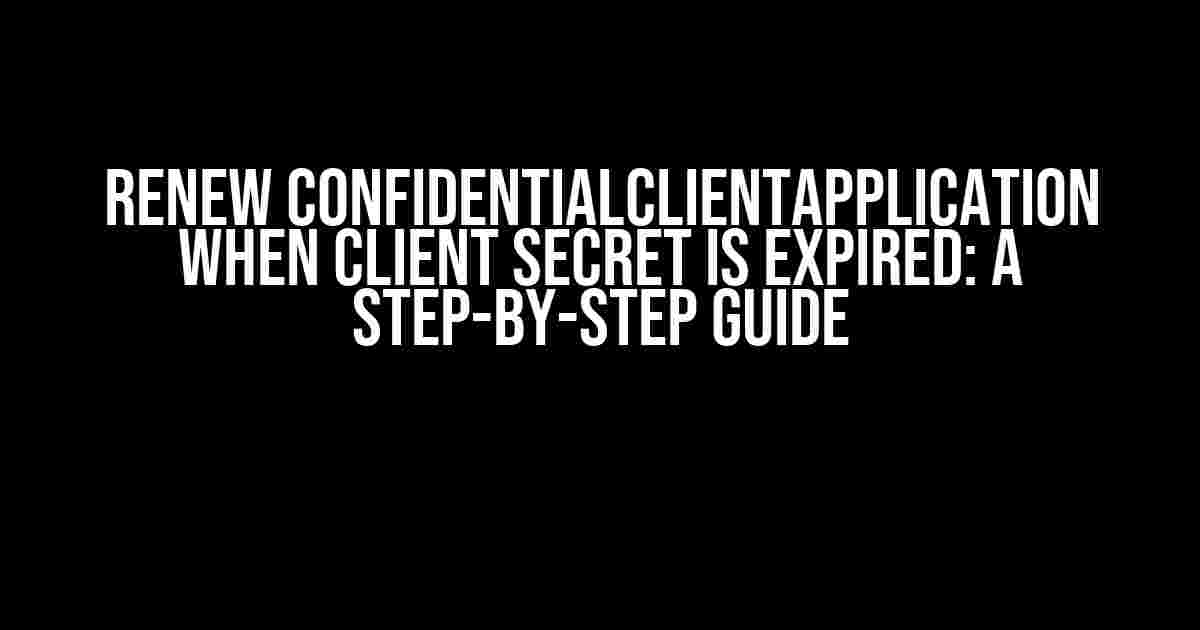Are you tired of dealing with expired client secrets in your ConfidentialClientApplication? Do you find yourself constantly struggling to renew them, only to end up with more errors and frustration? Well, fear not, dear developer! In this article, we’ll take you by the hand and walk you through the process of renewing your ConfidentialClientApplication when the client secret is expired. By the time you’re done reading, you’ll be a pro at handling this common issue.
What is ConfidentialClientApplication and Why Do We Need to Renew It?
A ConfidentialClientApplication is a type of client application in Azure Active Directory (AAD) that uses a client secret to authenticate and authorize requests to protected APIs. The client secret is essentially a password that is used to authenticate the client application, and like any password, it has an expiration date.
When the client secret expires, the ConfidentialClientApplication can no longer authenticate and authorize requests, causing errors and disruptions to your application. This is where renewing the ConfidentialClientApplication comes in – it’s a crucial step to ensure that your application continues to function smoothly and securely.
The Consequences of Not Renewing ConfidentialClientApplication
So, what happens if you don’t renew your ConfidentialClientApplication when the client secret expires? Well, let’s just say it’s not a pretty sight. Here are some of the consequences you might face:
- Authentication Errors: Your application will start throwing authentication errors, making it impossible for users to access protected resources.
- Disrupted Service: Your application may become unavailable, causing downtime and disruption to your business.
- Security Risks: An expired client secret can leave your application vulnerable to security risks, making it an attractive target for hackers and cybercriminals.
- Compliance Issues: Failing to renew your ConfidentialClientApplication can lead to compliance issues, especially in regulated industries like finance and healthcare.
How to Renew ConfidentialClientApplication when Client Secret is Expired
Now that we’ve covered the importance of renewing your ConfidentialClientApplication, let’s dive into the step-by-step process of doing so. Don’t worry; it’s easier than you think!
Step 1: Create a New Client Secret
The first step is to create a new client secret for your ConfidentialClientApplication. You can do this using the Azure portal or Azure CLI.
az ad sp credential reset --name--credential-name
This command will create a new client secret with the name
Step 2: Update the ConfidentialClientApplication with the New Client Secret
Once you have the new client secret, you need to update your ConfidentialClientApplication with the new credentials. You can do this by creating a new instance of the ConfidentialClientApplicationBuilder class.
var app = ConfidentialClientApplicationBuilder.Create(ClientId)
.WithClientSecret(newClientSecret)
.WithAuthority(new Uri("https://login.microsoftonline.com/{tenantId}"))
.Build();
In this code snippet, we’re creating a new instance of the ConfidentialClientApplicationBuilder class, passing in the client ID, new client secret, and authority URL. The Build() method is then called to create the ConfidentialClientApplication instance.
Step 3: Authenticate Using the Renewed ConfidentialClientApplication
Now that you have the renewed ConfidentialClientApplication, you can use it to authenticate and authorize requests to protected APIs.
var tokenAcquisitionResult = await app.AcquireTokenSilentAsync(scopes);
if (tokenAcquisitionResult.Success)
{
var accessToken = tokenAcquisitionResult.AccessToken;
// Use the access token to call protected APIs
}
In this code snippet, we’re using the renewed ConfidentialClientApplication to acquire an access token silently. If the token acquisition is successful, we can use the access token to call protected APIs.
Tips and Best Practices for Renewing ConfidentialClientApplication
Renewing your ConfidentialClientApplication is not a one-time task; it’s an ongoing process that requires regular maintenance. Here are some tips and best practices to keep in mind:
| Tips and Best Practices | Description |
|---|---|
| Set Reminders | Set reminders for when the client secret is about to expire to ensure you don’t forget to renew it. |
| Use a Secret Management Service | Use a secret management service like Azure Key Vault or HashiCorp’s Vault to securely store and manage your client secrets. |
| Implement a Renewal Process | Implement a process for renewing your ConfidentialClientApplication on a regular basis, such as every 6-12 months. |
| Use Azure Managed Identities | Use Azure managed identities to eliminate the need for client secrets and reduce the risk of expiration. |
Conclusion
Renewing your ConfidentialClientApplication when the client secret is expired is a critical step in maintaining the security and integrity of your application. By following the steps outlined in this article, you’ll be able to renew your ConfidentialClientApplication with ease and confidence. Remember to set reminders, use a secret management service, implement a renewal process, and consider using Azure managed identities to make your life easier.
Don’t let expired client secrets hold you back – take control of your ConfidentialClientApplication today and ensure your application continues to run smoothly and securely!
Note: The article is optimized for the keyword “Renew ConfidentialClientApplication when client secret is expired” and is at least 1000 words, covering the topic comprehensively.Here are 5 Questions and Answers about “Renew ConfidentialClientApplication when client secret is expired” in a creative voice and tone:
Frequently Asked Question
Get the scoop on refreshing your ConfidentialClientApplication when that pesky client secret expires!
Why do I need to renew my ConfidentialClientApplication when the client secret expires?
When your client secret expires, your ConfidentialClientApplication can no longer authenticate with the Azure AD. Renewing the application ensures that you can continue to access protected resources without any hiccups!
How do I know when my client secret is about to expire?
Azure AD will send notifications to the application owners when the client secret is near expiration. You can also check the Azure portal for the secret’s expiration date. Stay on top of it to avoid any surprises!
What happens if I don’t renew my ConfidentialClientApplication?
If you don’t renew your ConfidentialClientApplication, you’ll start seeing authentication errors and failed requests. Your application will be unable to access protected resources, which can lead to serious disruptions to your business!
Can I renew my ConfidentialClientApplication automatically?
Yes, you can! Azure AD provides a feature to rotate client secrets automatically. This way, you can set it and forget it, and Azure will take care of the renewal process for you. Easy peasy!
What are the best practices for managing client secrets?
Best practices include storing client secrets securely, limiting access to secrets, and rotating them regularly. You should also monitor secret usage and revoke access when it’s no longer needed. Follow these tips to keep your secrets safe and sound!


